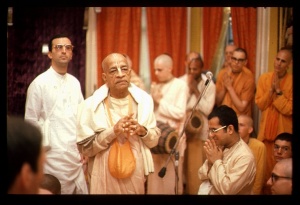CC Madhya 20.309: Difference between revisions
m (1 revision(s)) |
No edit summary |
||
| Line 1: | Line 1: | ||
{{ | [[Category:Sri Caitanya-caritamrta - Madhya-lila Chapter 20|C309]] | ||
<div style="float:left">'''[[Sri Caitanya-caritamrta|Śrī Caitanya-caritāmṛta]] - [[CC Madhya|Madhya-līlā]] - [[CC Madhya 20|Chapter 20: Lord Śrī Caitanya Mahāprabhu Instructs Sanātana Gosvāmī in the Science of the Absolute Truth]]'''</div> | |||
<div style="float:right">[[File:Go-previous.png|link=CC Madhya 20.308|Madhya-līlā 20.308]] '''[[CC Madhya 20.308|Madhya-līlā 20.308]] - [[CC Madhya 20.310|Madhya-līlā 20.310]]''' [[File:Go-next.png|link=CC Madhya 20.310|Madhya-līlā 20.310]]</div> | |||
{{CompareVersions|CC|Madhya 20.309|CC 1975|CC 1996}} | |||
{{RandomImage}} | |||
==== TEXT 309 ==== | ==== TEXT 309 ==== | ||
<div | <div class="verse"> | ||
dugdha yena amla-yoge dadhi-rūpa dhare | :dugdha yena amla-yoge dadhi-rūpa dhare | ||
dugdhāntara vastu nahe, dugdha haite nāre | :dugdhāntara vastu nahe, dugdha haite nāre | ||
</div> | </div> | ||
| Line 12: | Line 16: | ||
==== SYNONYMS ==== | ==== SYNONYMS ==== | ||
<div | <div class="synonyms"> | ||
''dugdha''—milk; ''yena''—as; ''amla-yoge''—in association with a sour substance; ''dadhi-rūpa''—the form of yogurt; ''dhare''—takes; ''dugdha-antara''—something other than milk; ''vastu''—substance; ''nahe''—is not; ''dugdha''—milk; ''haite''—to be; ''nāre''—is not able. | |||
</div> | </div> | ||
| Line 19: | Line 23: | ||
==== TRANSLATION ==== | ==== TRANSLATION ==== | ||
<div | <div class="translation"> | ||
“Milk is transformed into yogurt when it associates with a yogurt culture. Thus yogurt is nothing but milk, but still it is not milk. | “Milk is transformed into yogurt when it associates with a yogurt culture. Thus yogurt is nothing but milk, but still it is not milk. | ||
</div> | </div> | ||
| Line 26: | Line 30: | ||
==== PURPORT ==== | ==== PURPORT ==== | ||
<div | <div class="purport"> | ||
Of the three deities supervising the creation, maintenance and dissolution of the universe, Lord Viṣṇu is never separate from the original Viṣṇu. However, Lord Śiva and Brahmā, due to their association with māyā, are different from Viṣṇu. Viṣṇu cannot be transformed into any form of material energy. Whenever there is association with māyā, the personality involved must be different from Lord Viṣṇu. Therefore Lord Śiva and Lord Brahmā are called guṇa-avatāras, for they associate with the material qualities. The conclusion is that Rudra is not exactly Lord Viṣṇu but rather a transformation of Viṣṇu. Therefore, he does not come within the category of the viṣṇu-tattvas. Thus he is inconceivably one with Viṣṇu and different from Him. The example given in this verse is very clear. Milk is compared to Viṣṇu. As soon as milk touches a sour substance, it becomes yogurt, or Lord Śiva. Although yogurt is constitutionally milk, it cannot be used in place of milk. | Of the three deities supervising the creation, maintenance and dissolution of the universe, Lord Viṣṇu is never separate from the original Viṣṇu. However, Lord Śiva and Brahmā, due to their association with ''māyā'', are different from Viṣṇu. Viṣṇu cannot be transformed into any form of material energy. Whenever there is association with ''māyā'', the personality involved must be different from Lord Viṣṇu. Therefore Lord Śiva and Lord Brahmā are called ''guṇa-avatāras'', for they associate with the material qualities. The conclusion is that Rudra is not exactly Lord Viṣṇu but rather a transformation of Viṣṇu. Therefore, he does not come within the category of the ''viṣṇu-tattvas''. Thus he is inconceivably one with Viṣṇu and different from Him. The example given in this verse is very clear. Milk is compared to Viṣṇu. As soon as milk touches a sour substance, it becomes yogurt, or Lord Śiva. Although yogurt is constitutionally milk, it cannot be used in place of milk. | ||
</div> | </div> | ||
__NOTOC__ | |||
<div style="float:right; clear:both;">[[File:Go-previous.png|link=CC Madhya 20.308|Madhya-līlā 20.308]] '''[[CC Madhya 20.308|Madhya-līlā 20.308]] - [[CC Madhya 20.310|Madhya-līlā 20.310]]''' [[File:Go-next.png|link=CC Madhya 20.310|Madhya-līlā 20.310]]</div> | |||
__NOTOC__ | |||
__NOEDITSECTION__ | |||
Revision as of 12:36, 7 September 2021

A.C. Bhaktivedanta Swami Prabhupada
TEXT 309
- dugdha yena amla-yoge dadhi-rūpa dhare
- dugdhāntara vastu nahe, dugdha haite nāre
SYNONYMS
dugdha—milk; yena—as; amla-yoge—in association with a sour substance; dadhi-rūpa—the form of yogurt; dhare—takes; dugdha-antara—something other than milk; vastu—substance; nahe—is not; dugdha—milk; haite—to be; nāre—is not able.
TRANSLATION
“Milk is transformed into yogurt when it associates with a yogurt culture. Thus yogurt is nothing but milk, but still it is not milk.
PURPORT
Of the three deities supervising the creation, maintenance and dissolution of the universe, Lord Viṣṇu is never separate from the original Viṣṇu. However, Lord Śiva and Brahmā, due to their association with māyā, are different from Viṣṇu. Viṣṇu cannot be transformed into any form of material energy. Whenever there is association with māyā, the personality involved must be different from Lord Viṣṇu. Therefore Lord Śiva and Lord Brahmā are called guṇa-avatāras, for they associate with the material qualities. The conclusion is that Rudra is not exactly Lord Viṣṇu but rather a transformation of Viṣṇu. Therefore, he does not come within the category of the viṣṇu-tattvas. Thus he is inconceivably one with Viṣṇu and different from Him. The example given in this verse is very clear. Milk is compared to Viṣṇu. As soon as milk touches a sour substance, it becomes yogurt, or Lord Śiva. Although yogurt is constitutionally milk, it cannot be used in place of milk.